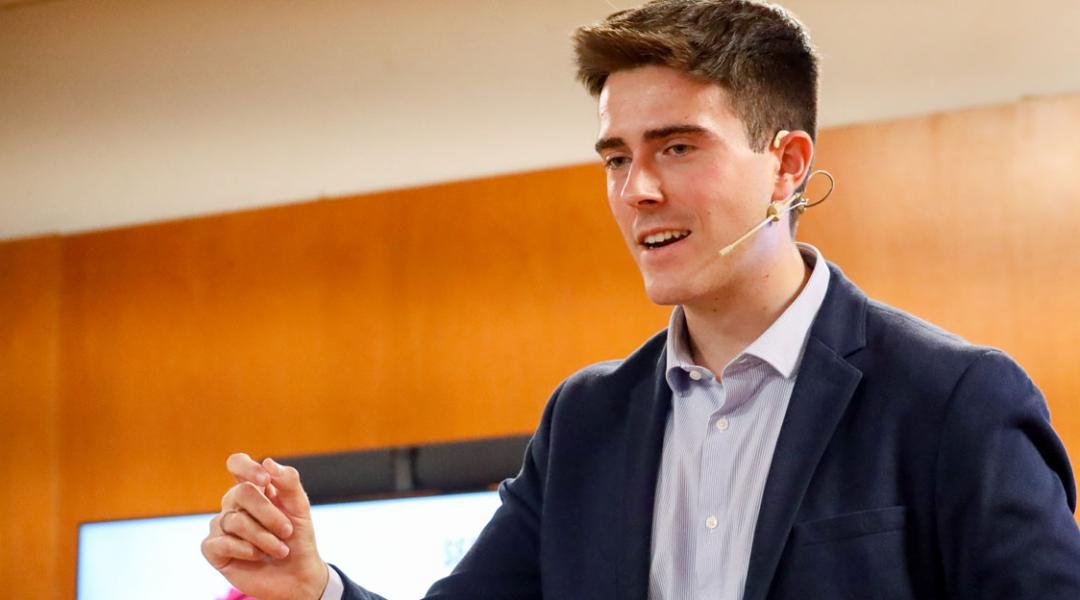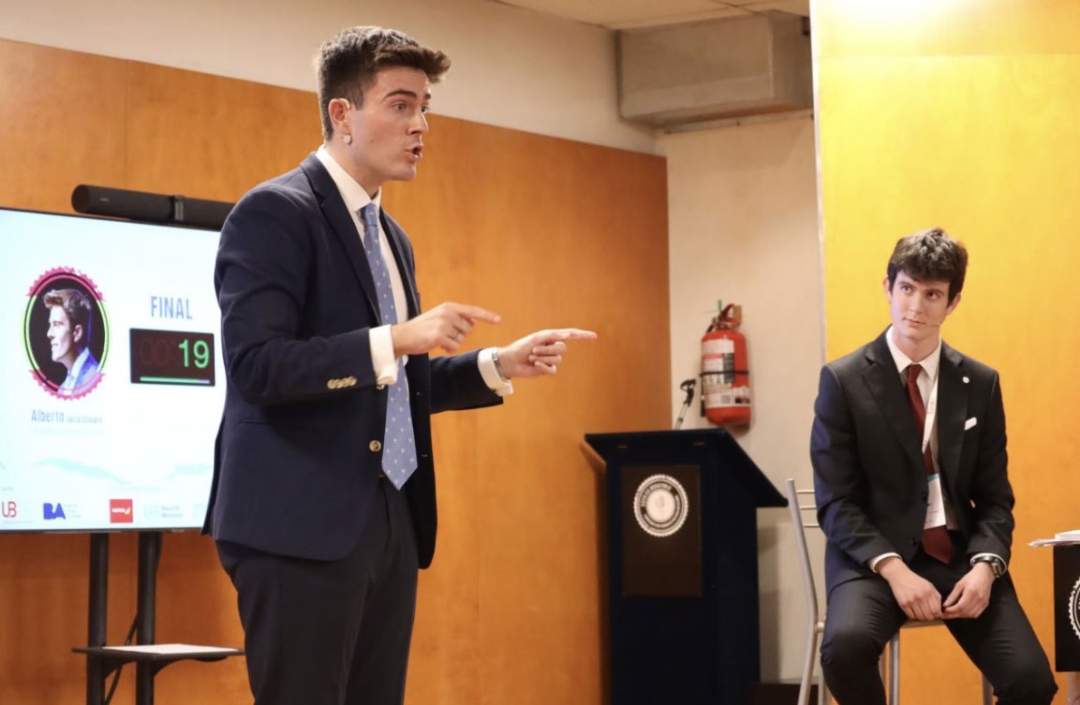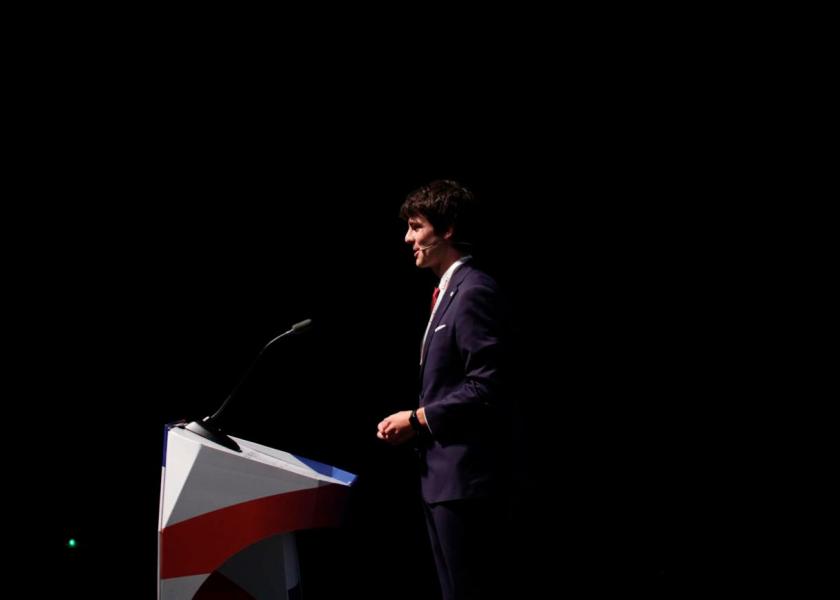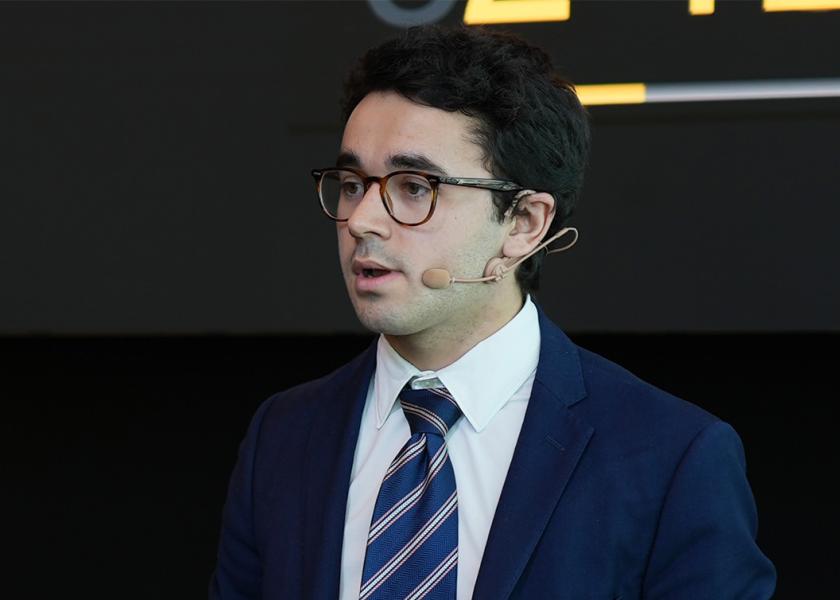Alberto García Chaparro
The power of conviction

Public speaking and debating came into Alberto García Chaparro’s life seven years ago. Today he’s a World champion in this field. During that time, he confesses to having become a radically different person. The competitions organised by the Spanish University Debate League (LEDU) have provided him with knowledge and confidence which, despite his youth, he has already applied at a professional level.
The victory by Alberto García Chaparro (Málaga, 2002) at the World Universities Debating Championship in Spanish is the culmination of a journey that started seven years ago, when this student of Law and International Relations discovered that debating competitions didn’t only exist in films. “Winning such a wonderful competition as the World Championship after all that time dedicated to public speaking and debating is a huge joy. I see this victory almost as a full stop,” he assures us. Because the professional world is knocking at Alberto’s door, a setting where he’s already proving everything that debating and public speaking has given him over the years: knowledge, confidence, and eloquence. He precisely argues that debating is essential in any professional field and that’s why he also provides training. At the World Championship final held at the University of Belgrano (Buenos Aires, Argentina) the topic for debate was: Is it acceptable for less developed countries to pollute more until they achieve the level of progress of more developed countries? He argued in favour and the jury declared him the winner with an indisputable 7-0. So, we asked him about the key to his success: “Knowledge adds up, but conviction multiplies. That’s the distinguishing factor that tips the scales during a debate,” he confesses.
How did you prepare for such an important event as the World Universities Debating Championship in Spanish?
My prep was special because these were different circumstances, not only because of the relevance of the event, but also because of the place it was held at and the people against whom I was competing. Since it was far from home, I focused heavily on learning how Argentinians speak, or what the people who were going to judge me might be like.
Is knowing your audience that important when debating?
The ultimate goal of a debate is to convince and persuade the crowd; the most important exercise is getting to know them beforehand. To me this isn’t a minor thing because the real key to debating lies in being able to adapt your message to the place where you are communicating and the people who are listening to you. You have to ask yourself: which is the particular message I want to convey in this place?
“The real key to debating lies in being able to adapt your message to the place where you are communicating and the people who are listening to you”
Public speaking training is still lacking in Spain, but the final was between two Spaniards. Are we more talented than we believe?
In general, Spain has more talent than we think. It’s true that we lack an education in public speaking and debating, which starts at school and drags on at university. Despite this, in recent years it has been promoted thanks to the work of organisations like LEDU and supportive companies like Iberia. We need to stop seeing it as a typically American thing because it’s something that can change your life.

Alberto García Chaparro observed by his rival at the final, Óscar Rodríguez de Vivero, also a Spaniard. © Courtesy of LEDU
Since we’re talking about talent, what does that word mean to you?
For me, talent needs to be comprehensive; what I mean by this —and I’m going to explain it in my public speaking and debating terms— is that being well-spoken isn’t enough, you also have to be good at building arguments or rebuttals. The more you develop the particular skills of your activity, the more comprehensive and, thus, the more talented you’ll be.
Tell us which skills you need to be a good public speaker.
Curiosity is one of the most significant drivers that exist in the world, and it’s essential to be a good public speaker. It makes a big difference when preparing for debates. Another is the ability to work in a team because a public speaking debate isn’t usually an individual activity —even though the World Championship is— and you learn a lot from colleagues and professors. Thirdly, managing success and failure because you lose more than you win. In a debating competition, the criteria are subjective, who wins and who loses is decided by the jury, it’s not maths, and that’s why managing your emotions is particularly relevant.
“Curiosity is one of the most significant drivers that exist in the world, and it’s essential to be a good public speaker. It makes a big difference when preparing debates”
And what value do you give everything surrounding words during a debate?
It’s all extremely important. To give you an idea, during the World Championship I changed the way I was dressed between the semifinal and the final. Why? Because you also have to adapt to the message you want to convey. In the semifinal I defended a position against less developed countries being able to pollute more and I chose a more informal outfit, minus the tie. In the final I had to argue in favour and chose a more formal attire, with a tie. Also, my rival in the final was Óscar Rodríguez de Vivero, who’s slightly taller than me, so I had to use my clothing to raise my game. I also took special are of the colours I was wearing, so that they didn’t stand out and went with the setting... All these details are not defining to win a debate, but they can help you to almost unconsciously win over the judges.
Does public speaking and debating have the power to democratise words?
Absolutely. Since I got into university, I’ve been teaching other students about public speaking and debating and many, in the beginning, don’t understand how useful it can be if, for example, they want to work in engineering. I explain to them that an engineer also has job interviews, has to present a project to their company or has to convince an investor if they want to become an entrepreneur. Public speaking and debating aren’t only useful for law, politics, or communication students, it’s useful for anyone who’s going to enter the job market.
“Public speaking and debating aren’t only useful for law, politics or communication students, it’s useful for anyone who’s going to enter the job market”
In the era of overexposure to the media, where every word is weighed, is there room for improvisation in speeches?
Improvisation reflects the knowledge about what one is saying, so we should give it more room. Sticking to the role we’ve been given, even though we’ve spent a lot of time preparing, isn’t attractive in terms of communication. Also, people value natural speech because it conveys closeness. Arguments, rebuttals, rhetorical confrontations have to come from within, with feeling.
To close, tell me what got you hooked on debating and how you encourage others to give it a try.
I’ve always wanted to work in the fields of education and politics, and communication is essential in both fields. I discovered that competitive debating existed, that it wasn’t just something you saw in films, and I got hooked. Seven years later, I’m the World champion. Thanks to public speaking and debating, now I’m a completely different person, I’ve gained knowledge and confidence. Whatever my job is in the future, public speaking and debate will always be by my side.


